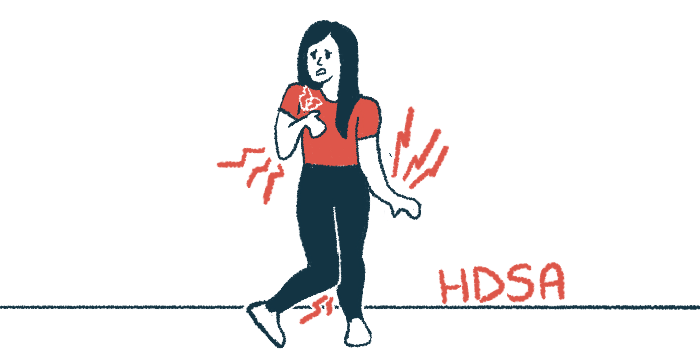HDSA 2025: Support can help combat Huntington’s disease stigma
Social workers at convention offer tips for dealing with 'societal symptom'

People affected by Huntington’s disease often experience stigma, but — according to two social workers, and patients themselves — this can be combated by building loving communities and being proactive about sharing experiences and asking for support.
At the 40th annual convention of the Huntington’s Disease Society of America (HDSA), held June 26-28 in Indianapolis, social workers Emily Zivin and Courtney Gatza discussed the impact such stigmatization can have on individuals with the neurological condition and their families. In a talk titled “Words Matter: Understanding Stigma in HD,” the duo also offered strategies for dealing with the stigma that can come with living with Huntington’s disease.
“We want you to know that you are not alone,” said Zivin, who works at the Feinberg School of Medicine at Northwestern University in Chicago.
Health stigma is defined as labeling, bias, prejudice, stereotyping, and/or discrimination against people who are identified with certain medical conditions. Zivin called it a “societal symptom that impacts [Huntington’s] and many diseases.”
While this is based on others’ perceptions, it’s not reflective of actual reality, Zivin said, even though many people who experience stigma find themselves internalizing and believing some of these perceptions.
“It’s actually the opposite of empathy,” Zivin said. “It’s people looking from the outside and making judgments and not [understanding] what’s going on.”
According to Gatza, who works at Indiana University’s HDSA Center of Excellence, stigma can come from a variety of different places, including institutions like health centers or workplaces, people from acquaintances to family members, and television and social media sites.
Experiencing stigma is incredibly common for people with disabling health conditions: Indeed, about 97% of people with disabilities report experiencing discrimination. With Huntington’s specifically, this can involve both the disease’s motor and mental health symptoms.
The fact that Huntington’s is a genetic disorder that runs in families adds another layer of complexity affecting choices like getting tested and family planning, the social workers noted.
Importantly, stigma doesn’t just lead to hurt feelings. It can have serious, tangible consequences — from delaying medical treatment due to stigma from healthcare providers, to discrimination in employment, to social isolation. This creates a vicious cycle, because when people feel isolated, they lack the support to effectively deal with stigma, the speakers said.
Disease stigma worse when patients feel isolated
To deal with stigma, Zivin and Gatza emphasized that it’s crucial to build a loving community of people who are willing to put in the work to understand what’s going on and to offer support. The best way to do this, they said, is to communicate openly and ask for help whenever needed.
“Give yourself empathy and surround yourself with people who love you and understand,” said Zivin, who previously worked for the HDSA Illinois chapter.
“I think it’s really important when you come from an [Huntington’s disease] family to tell people what you need, because people want to help, but they’re really, really afraid,” Zevin said. “You tell them … this is what’s going on. It’s hard. I’m doing my best. We’re doing our best.”
When you own what you want people to know, it kind of puts the power back in your hands and the ability to eliminate that stigma that people place on you.
Another key tool for fighting stigma is to be proactive about sharing one’s own story, so that others can understand without filling in their own assumptions or making inaccurate guesses.
“When you own what you want people to know, it kind of puts the power back in your hands and the ability to eliminate that stigma that people place on you,” Gatza said. “We are the writers of our story, and we can combat the stigma that … people place on us.”
As an example, Zivin noted that people with Huntington’s may feel embarrassed or stigmatized in situations like going out to a restaurant. One practical way to deal with stigma in these situations might be by simply communicating to staff that the person has a neurological disorder.
“We might need a little bit more space and a little bit more patience,” Zivin said. “We might make a little bit more mistakes.”
Audience at convention also offered helpful strategies
Using the general phrase “neurological disorder” can be a useful way to sidestep uncomfortable discussions about the disease’s specifics and its genetic component, Zivin noted. She suggested that it may be helpful to carry a card with what to say that can be quickly referenced.
HDSA offers ID cards that can be handed out to help people with Huntington’s quickly convey their status to new people they meet. The cards also provide a variety of resources that can be used to quickly share information without the need for long and emotionally fraught conversations.
Several members of the audience at the HDSA convention also chimed in with strategies that they have employed to help combat stigma.
One person emphasized the importance of sharing physical space with the person with Huntington’s — for instance, holding a family gathering in a bedroom rather than the kitchen for patients with movement difficulties or bedridden.
Another audience member said it can be helpful to proactively tell people to let the person with Huntington’s talk, and not try to jump in or finish their sentences for them.
One audience member voiced frustration that her husband’s symptoms are currently more cognitive than motor, and other people will sometimes comment that he doesn’t “look sick.”
Gatza offered the possibility of reminding people that “there are lots of common illnesses that aren’t physically noticeable, but are real.” “I wouldn’t question your sore throat,” and it’s “important for you to know that what I’m telling you is true.”
Note: The Huntington’s Disease News team is providing virtual coverage of the Huntington’s Disease Society of America annual conference June 26-28. Go here to see the latest stories from the conference.







